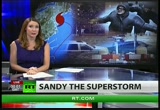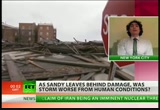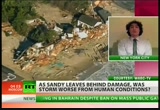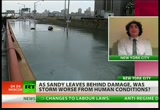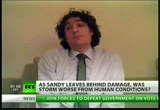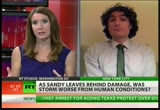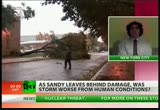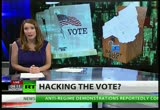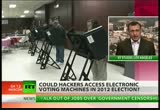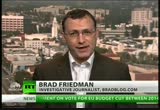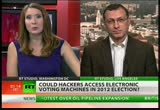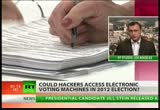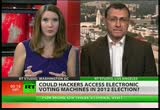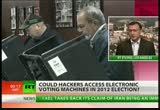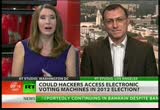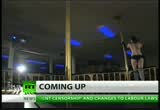tv [untitled] October 31, 2012 8:00pm-8:30pm EDT
8:00 pm
superstorm sandy stirs up trouble along the east coast for days leading up to this weather phenomenon we heard about cities getting ready for the worst but could the way we live and how we build our homes businesses and infrastructure actually make a bigger impact. and we know our computers and cell phones could be hacked but what about electronic voting machines they are computers after all coming up we'll take a look at how safe and secure these machines really are. and how he how are we a little ghosts and goblins load up on treats big candy companies are up to their old tricks sending sweet campaign contributions to the candidates of their choice
8:01 pm
we'll tell you the spooky details of this multibillion dollar industry. good evening it's wednesday october thirty first eight pm in washington d.c. i'm christine for zero and you're watching our t.v. . well good evening and happy halloween we're going to start this evening with a closer look at franken storm that super storm named sandy pictures of destruction and devastation continue to come in as millions of americans try to pick up the pieces from what is now being referred to as the worst storm in at least one hundred years we want to talk about the effects of the storm and dissects not so much the weather weather patterns that lead to it but the patterns in lifestyle that led to some of this extreme damage and wreckage earlier i was joined by jacob remus assistant professor at suny empire state college as a disaster area story and having seen the rash from superstorm sandy straight from
8:02 pm
new york i asked him what some of the lessons were that could be drawn from this event i think that we see some of the same patterns that we see in other disasters we see that different people are affected in different ways so for instance in the evacuation zone in new york city. that the creation zone a as it was called people were more than twice as likely evacuation zone a. thing than they were in the city at large so we already know that in york city people who are already most vulnerable are already were people who are being affected. that's what we see in new york city but what about what we've seen in some of these other areas the jersey shore. some of these beach communities that really have gotten her here yet. one of the one of the things about the doctor is that.
8:03 pm
build in places where where might be dangerous and we know this and that through a lot of that we do a lot of things that are dangerous and i'm not at all thing that people shouldn't be living on the jersey shore i'm saying that part of living in the world is having added risk and part of the question. and one of the ways we manage risk is by having the government in abingdon of government government programs things like blood letting sure and things like. and other aspects of the government that protect us when things go wrong so connect the dots for me because taking a look at new york city as you say a lot of the people already the most vulnerable living in public housing these are the people affected quite a bit then we have these people at these nice beach many of these homes these nice cars destroyed and of course you can't see a storm like sandy and not remember what happened during katrina so connect the dots here and sort of bring forth
8:04 pm
a bigger picture sure. the first dokic and that is to find that there's no particular there's no particular way to know what storm is created by climate change there have been hurricanes for a long time or king actuate in intensity and. numbers so we can't say precisely this is a claim it's a disaster but what we do know is that. as oceans rise because of climate change storm surges will get worse that makes us more vulnerable to the day to the storms that do happen and there is some. evident that the intensity of storms will increase the number of storms that are particularly bad that's the first the second thing is as with katrina we have to look at the way we build our research right at the end of katrina the streets of new orleans were. what happened was the infrastructure that we built the levees collapsed in your part of the question is
8:05 pm
what is our infrastructure does or does our subway system allows for us which we depend on to a tremendous amount. is it good enough for the climate we live in and i think what this week is showing us with means there's no places like long island where ninety percent of people don't work for the jersey shore the question is does our electrical grid out of that have that ability to service in a disaster and i think the answer is pretty clearly no and it's really tough here because when you take a look for example of the new york subway this is something i was shocked to learn seven million people a day people coming in and out of different parts of new york of jersey. and of course within you know the island of manhattan of course but one hundred five hundred eight years is
8:06 pm
a pretty good run to go without having any major disaster of course and now that we have this it certainly is an appropriate time to ask these questions is it good enough so i mean i guess what's the you know how do we measure this here. disasters are disasters for reasons one being that may have that's why we call them one of the things that makes a disaster is that thing that we rely on every day don't work and we're going to have we're going to have disasters and part of the question is how do we recover from disasters people like me call this resilience how do we society in communities that are very resilient when a disaster strikes so one of the things to look at with the new york city subway is who is most affected by this inability to get it i'm not at work you can you can see i'm at home but it doesn't matter to me too much i'm a college professor i'm not paid by the hour by not at work it doesn't matter the person who is telling me food at the bodega the person who is working
8:07 pm
at the hotel or the supermarket in low wage contingent or they're not so lucky those people are are extremely dependent on working public transportation and so it's one of the ways we can see that the disaster that different people differently and that we need to take that into account in our measurement of what is going on so i guess what's the proposed solution then clearly you're pointing out a problem i think it's a viable problem it's an important one to talk about but but what could be done differently. that's a really good question. i'm not an engineer but i have seen discussion today of plan to build. a new york. from storm surges there are various other engineering or technological means by which to protect the city the city of new york infrastructure or. the
8:08 pm
infrastructure the power infrastructure of long island or new jersey for instance. the line. or my line and your very. something that something traditionally our community really reluctant to do that superfund. but it's a choice it's a choice we make or give me just final question for you i want to talk about something that a whole lot of people aren't aware of and that is that during the storm the path of superstorm sandy there were twenty six nuclear plants i know at least two of them had to shut be shut down part of them out to be shut down the surrounding areas put on high alert talk a little bit about the effect of this and what people who are planning people who are engineers should take into account. i think one of the things that a disaster. and a half ago shows is that when nuclear power fails really dramatic.
8:09 pm
and it tends to stand on a time when the rest of society is having problems so let's imagine thank goodness it didn't happen but let's imagine that one of the beach when the stick went and had a real problem that would have distracted the governor and the mayor and the president and every. resource distracted some of the people who are now in shelters or people who are now meeting in new york and and egypt and the rest of it and the rest of the eastern seaboard so i think we're really lucky we see a b. and i think the way to way to fix that is move away from there because there's no state there absolutely well they can bring us a system press professor at city empire state college enjoy the day off i'm sorry are students are not upset about it but i do want to thank you for being on the show today thank you very much it's my pleasure. well another result of monday's storm was the postponement of artie's very own third party debate which was
8:10 pm
initially scheduled for yesterday however dude how to ensure the safety of the candidates and our crew the debates will now occur on november fifth just one day before the general election. governor romney you know we both agree we agree we need to bring the tax rates down i felt the same as the president did governor romney i'm glad. you agree with let's come back to something the president i agree on and you tube you agree that the voters have a choice perhaps you wonder who to vote for when romney and obama agree on so many things remember you do have other options come november sixth tune in to see the second round of debates between the major third party candidates right here on r.g.p. . well when rescheduling we couldn't have possibly taken into account that one of the debate participants would be detained however as of this morning green party candidate jill stein was arrested while protesting the keystone x.l. pipeline in texas this is time second arrest in less than
8:11 pm
a month the last time she saw handcuffs it was while protesting outside the second debate between president obama and republican candidate mitt romney. well there's a major concern with the upcoming election and that is whether or not people who do vote will have those votes counted with quite a few states relying on electronic voting machines with no way to verify votes a lot of voters are now concerned that the democratic process could be a risk the christian science monitor recently published an article titled could be evolving machines in the election two thousand and twelve be hacked yes the article breaks down how the zero to machines are not connected to the internet but hackers can visibly manipulate them or target the companies that service them and since nothing is on paper both could be altered without anyone knowing. so just how vulnerable is the election process brad free minute investigative journalist and author of brad blog dot com joined me earlier to talk about this and we first talked about whether or not voters should be concerned. of course it should be
8:12 pm
concerned whatever the makers of in the machine said about security being updated is untrue i would also add that it's not just the the touch screen voting with machines that are a concern those are used by about a third of the electorate but every state all fifty states use computer optical scan systems which are equally vulnerable to both hacking and simply failure they fail all the time we saw a paper ballot election on an optical scan system down in palm beach county florida earlier this year in march where it named three elections incorrectly it named two losers to be the winning candidates of the race so the problem is nobody bothers to go back and check those paper ballots to make sure the computers got it right so whether it's the optical scan systems or the touchscreen systems they are both vulnerable to hackers most disturbingly from insiders not from you know voters or
8:13 pm
hackers outside but insiders that's the greatest concern and as well nobody bothers to check to make sure any of these computers got it right after the election gravity suggesting when you say insiders i mean are you talking about the people that own these machines that service these machines are you talking about poll workers what's the concern here well kind of all of the above but certainly the election officials have access to the central tabulators which in about thirty seconds can be hacked to flip an entire election and if you go back to the to the baker carter election reform commission that was formed after two thousand and four that was a compromised commission by the way yet even they came out and said that the greatest threat to these systems is from insiders from election insiders so these systems are at threat from outside and inside which is why i've been calling for some time for paper ballots that are hand counted that can be overseen. by the
8:14 pm
citizenry so that we don't have to trust whether the electronic systems have gotten it right or not they may get the numbers right the problem is we the people have no way to know whether they did or not that i grade threat to the mark and you know about a lot of people have said you know it's twenty twelve most of us use a.t.m. machines that spit out a receipt that could then be deposited into an actual ballot box so you have the electronic voting but you know if there are any questions about the result it could just be cross-checked against paper results why do you think this isn't in place well to a certain extent it is some of these machines do spit out paper receipts that you don't want to take a receipt with you because that leaves a vote buying and selling and intimidation and so forth but yeah you're talking about a lot of people given that argument i'm just talking about having you know a box there you do your thing or it spits it out and i've never seen that i've voted in several different states depending on where i've been living at the time
8:15 pm
and i've never seen the receipt but just something to leave at the polling place well you can go back go to brad blog dot com find out what happened about two or three years ago to me when i tried to vote on one of these systems the computer mis printed four out of twelve my own votes and it took me about twenty minutes to look and make sure you know it didn't really misprinted did i get it wrong was it the you know my fault was it the machines fault it turned out it was the machines fault but you know studies have shown that eighty percent of the people who use this type of system don't bother to check the paper printout and study at rice university for example showed that of those few people who do check the summary at the end of the balloting some two thirds of them don't notice when the computer has flipped their vote so even if you have a computer printout and even if anybody bothers to go and check it to counted after the election and nobody ever does even if they did. we would not know if we're
8:16 pm
looking at something that actually reflects the voter intent or not the only way we can know that is if we look at a hand marked paper ballot and there's no problem with those we just continue to imagine that there is and continue to give billions of dollars to private corporations who have privatized our once public election and well i think there's a lot of different layers that you bring up here of course and we talk about paper ballots people kind of have a little bit of p.t.s.d. from the two thousand election when there was hanging chads and pregnant chads and all kinds of things when these holes were punched another interesting piece of this puzzle is that even though the individual election boards may own these evoking machines the software inside the machines you know is basically proprietary to the manufacturer that's been confirmed by u.s. courts right so talk about right about transparency here i mean this is
8:17 pm
a democratic process. well and the heart of any democratic process is transparency and there is zero transparency in these systems they're all of proprietary systems you're correct that both the hardware and the software is the proprietary property of these private corporations some of them who have dubious ownership to say the least we were on talking a few weeks ago about the fact that mitt romney's son and his former business partners at bain and some of his top bundlers his top donators to his campaign have now taken over have now acquired a company by the name of heart and or civic the third largest voting machine company in the country that should be a concern to anyone but it's not just the fact that you know romney has ties to a voting machine company it's that all of the voting machine companies used in all fifty states all have private ownership who are unaccountable to the people and you
8:18 pm
systems that are one hundred percent on transparent to the citizenry i can't make that clear enough brad here you have it so our elections we have at you know a twenty four hour cable news cycle in this society that we live in constantly talking about sort of you know the election as a sporting event this is a topic i hear very little about you say people should be outraged why aren't they . well one of the reasons and you're right we all cover the horse race on all of the cable channels but very few people cover the track conditions which has as much effect on who's going to actually win that horse race listen but neither of the major parties want to talk about this the republicans don't want to talk about it the democrats don't want to talk about the democrats like to pretend that discussing these things depresses turnout i've seen no actual evidence to support that is by practicing evidence quite the contrary that when people hear about this
8:19 pm
they get mad as hell they want to fight to vote and they want to make sure that their vote is counted and counted accurately but listen we know that the mainstream corporate media only covers what the two major political parties essentially tell them to cover so if they don't talk about it neither will the corporate media bradley brad friedman investigative reporter for brad blogger dot com ed thanks so much. still ahead on r t a getting down to the bare necessities when you think of the labor movement exotic dancers probably not the first thing that comes to mind but up next we'll tell you about a lawsuit some of these ladies have final in their quest for better pay. the bill.
8:20 pm
i will say. that i also promised that i was able to sit on them or be above my limbs . we want to bring you the story now of a battle for workers' rights unfolding right here in washington d.c. it involves dancers at a strip club called the house who say sometimes they leave their shifts with less money than they came in with that's because in addition to being paid well below the minimum wage they're also required to pay the d.j.
8:21 pm
just for playing music while they dance two of these dancers have now filed a class action lawsuit against the management of the house so the question at hand is whether these women some of whom are working fifty sixty hours a week are full time employees who deserve minimum wage and benefits or whether they can be treated as independent contractors the attorney in this case of phil zippin partners of the law firm joined us earlier to talk about why so many strip clubs have these labor issues i first asked him if the amount of money received from tips is enough. well the tips would be enough if that's the way the clubs structure their pay but they don't they treat these women as independent contractors as you mentioned and that gives the clubs the out to say well you're independent contractors we don't have to pay you anything if they treated them as you would a bartender or a waitress you pay them a sub minimum wage of three dollars an eight cents an hour whatever it might be and then they keep their tips but that would require extensive record keeping which
8:22 pm
these clubs do not want to do so it is a trend we've seen all across these clubs in the jurisdictions that we practice in maryland virginia west virginia and d.c. that they don't keep records they don't keep payroll records they don't keep time records they simply don't pay these women anything and tell them they can keep their tips as their own and their only source of remuneration and from what i understand the dancers also have to tip the d.j. and they're only getting paid this three dollars an hour when they're actually onstage is that right actually that i getting paid anything only getting the tips they're only getting but they're paying the d.j. and they're also paying ten or twenty dollars a night to dance so imagine and madge and a scenario where your employees are coming to work and paying you for the privilege of working wow that's why these clubs are in good financial shape because any business that operates with the employees paying to work has got to be making some money so so is this unique to this place to house or is this sort of
8:23 pm
a common practice this is not unique to that house we have we have filed nineteen different lawsuits against nineteen different clubs in d.c. maryland virginia and west virginia and this is the the one thing they all do is they don't pay these women anything so it's just a business model that they operate under and something that's really interesting to me is that you have filed a lawsuit against the house before and you won from what i understand. a judge agreed with you that these women were employees and they should be made paid and national minimum wage and the house had to pay three hundred forty five thousand dollars in back pay to these workers how is this already happening again. i would say in short it takes a while before people start realizing that it costs more to violate the law than it does to comply with the law and our job as employment lawyers working with people who come to us is to help make these laws something that can be enforced so when
8:24 pm
the clubs get it and frankly it's going to take a while because this business model has been in place for a long time it's been very successful for these clubs when they get it they're going to start paying these women according to at least a sub minimum wage they can do it other ways but at least the sub minimum wage that you referenced earlier talk a little bit about you know how this works i mean if you go and apply here you're told that these are the rolls take them or leave that's correct what happened in the case we filed in d.c. where we had a federal judge rule in our favor and find as a matter of law that these women were employees what she found was it didn't matter what the agree what the private agreement may have been between the club and these women in other words you can't subvert the federal fair labor standards act that's a law that requires a minimum wage for all employees so you can say listen you sign here you're an independent contractor you agree we agree but the judge says that does not control what controls what the economic reality here and the economic reality is these women are dancing that's their job they're entitled to be paid at least minimum
8:25 pm
wage and that's what the judge ruled so what about you know the management of the club what what are they saying what's their defense here i don't think they have a real defense i think their defense is they'd like to have the defense be their independent contractors but that's the issue that the judge ruled squarely against them and i think that that has caused a lot of these other cases that we have file to be settled because the management is looking at this and saying we can't really justify calling them independent contractors they show up they have a schedule they pay if they miss a day they pay if they're late they pay to come to the club and dance they have all the addition of employee employer relationship and they know they're going to lose on that issue and so the question becomes. do we pay now and get it over with maybe it's painful but it's more painful later and that's i think what the clubs have been concluding now does this work with the current lawsuit i mean from what i saw you've got two women who are part of this now why aren't there more women i mean do you think there's pressure from above not to get involved there is absolutely
8:26 pm
pressure both implicit because these women don't want to get involved and explicit when the club management says listen here's your chance you do this and you're adding here now that's illegal to do that's retaliation it's against the law but that doesn't mean it doesn't have the two women involved in the current lawsuit been fired no they have not as far as i know what we do when we file these cases because we know every time there when there's smoke there's fire we asked the court to allow us to send notices to all the other women there dancing for the last couple of years of this club and anyone who wants to can then join in the lawsuit they don't have to but they can because we've already set the pace and they can join in if they want so what's a bigger takeaway here i mean a lot of people will look at this and say oh a strip clubs you know they have their own rules as it is anyway but this is you know like i said this goes on in other types of businesses as well i mean how does this change systematically well i think the bigger takeaway is we're looking at an
8:27 pm
industry where the women are treated as when i say independent contractors they get no benefits no health insurance no unemployment no workman's comp no four hundred k. no retirement no pension no nothing so there are times when they're there they're dancing days are done they get nothing to walk and let's be honest this is not a business that you can work in for forty years at least most women it is probably it's probably an understatement this is a short lived career so the point being that this is their way of giving a little bit of justice and fairness to these women who are exploited there's no question that they're exploited and they leave with nothing so now we're hoping to give them something that they can leave with right well we certainly appreciate you breaking this down for us an interesting case philip and partner at zippin law firm . well i'm sure you've heard of big oil and big tobacco those lobbying groups that spend quite a bit of money trying to convince consumers and lawmakers alike that their product is necessary for the country what you may not have heard of is big candy and i'm
8:28 pm
not making this up thanks to the center for responsive politics we now know there is quite a bit of money given to political candidates by the companies responsible for filling up those trick or treat bags so on this halloween night r.t. correspondent liz wahl breaks down some of the politicians the biggest candy companies are sweet on. as millions of americans today splurge on sugary treats not only is it making kids happy and hyper it's also a treat for big candies we're talking about the candy lobby and they're dishing out the dough for candidates they want on the menu and it looks like big candy has a sweet tooth for republican candidates the top candy lobby is nestle a company that makes kickout bars and butter fingers in addition to hot pockets in haagen does the prepared food giant spent over eighteen thousand dollars on mitt romney's campaign less than half of that went toward president obama next up jelly belly jelly bean company known for flavors like chili mango and buttered popcorn
8:29 pm
their favorite political flavor rick perry followed by rick santorum but despite jelly bellies efforts americans couldn't stomach either candidates as they were defeated in the primaries and the maker of the great american chocolate bar hershey's favorite libertarian leaning republican presidential candidate ron paul donating over two thousand dollars to his campaign but as you can see her she's also tends to back republican candidates many from their home state of pennsylvania but they're actually don't win out even bigger bucks on lobbying spending seven hundred seventy seven thousand dollars on trade labor anti-trust and workplace issues so as childhood obesity and diabetes reaches epidemic proportions in the u.s. remember big candy is banking on children reaching for those sugary treats each and every halloween in washington liz wahl r.t. . all right well that's going to do it for us for now but for more on the stories we covered.
43 Views
Uploaded by TV Archive on

 Live Music Archive
Live Music Archive Librivox Free Audio
Librivox Free Audio Metropolitan Museum
Metropolitan Museum Cleveland Museum of Art
Cleveland Museum of Art Internet Arcade
Internet Arcade Console Living Room
Console Living Room Books to Borrow
Books to Borrow Open Library
Open Library TV News
TV News Understanding 9/11
Understanding 9/11
